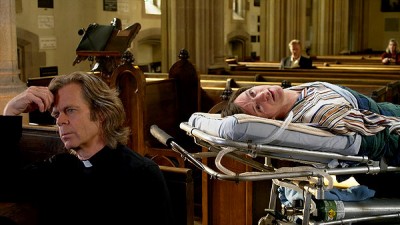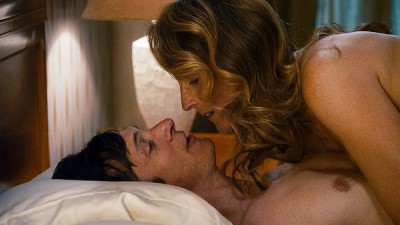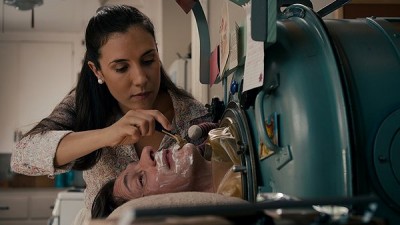
The Sessions is almost certainly going to be one of the more successful — possibly the most successful — “art” titles of the year. It comes with a raft of good — even great — reviews. It fetched an unusually high price at Sundance, which translated into a strong campaign from purchaser Fox Searchlight. It has Oscar buzz (mostly for star John Hawkes). And it won the Audience Award at Sundance. (It’s that last recognition that might give you some cause for pause because Audience Award winners are often pretty dire.) The truth is, it’s almost exactly what you’ve been led to believe — an uplifting, mildly comedic, fact-based story with an attention-getting premise and central performance. It’s competently made in every possible capacity — and that may be its biggest drawback. Take away the nudity and the frank sex talk and you’d pretty much be left with a high-minded TV movie — with unusually good actors. As for the filmmaking…well, let’s just say that it’s no great surprise that writer-director Ben Lewin’s last job was an episode of Touched by an Angel.

The film deals with the attempts of poet/journalist Mark O’Brien (Hawkes) — a polio survivor confined to an iron lung for all but a few hours out of the day since the age of 6 — to experience sex. At the time the movie takes place, O’Brien is 38, and fully cognizant of the fact that he’s nearing his “use by date,” so there’s a certain urgency to the situation. His immobility from the neck down and his general situation has effectively scotched his own efforts in the matter, so — after getting the go-ahead from his priest, Father Brendan (William H. Macy) — O’Brien enlists the aid of a sex surrogate, Cheryl (Helen Hunt). She’s a thorough professional — but has kind of a hippie vibe (the film is set in the late 1980s) with a guitar-playing philosopher (read: unemployed) husband (Adam Arkin). She quickly lays down the guidelines: There are to be six sessions — and that’s it. Of course, in order to make this any good as drama, it doesn’t turn out to be as cut and dry as that sounds.

Nothing that follows is exactly surprising — at least until the altogether too pat power-failure-ex-machina wrap-up — but it’s generally agreeable, not in the least because the film doesn’t tend to overly sentimentalize the material. The decision to portray O’Brien as slightly naïve, but ironically amused by his own situation goes a long way to make the film more likable than it might have been. Hawkes’ performance — while not the brilliant characterization it’s been painted as — is good enough to make that aspect work. All of the performances are solid, if sometimes a little simplistic. (Macy’s Father Brendan makes Bing Crosby’s Father O’Malley in 1944’s Going My Way look pretty complex, but that’s as much in the writing as the acting.) Hunt starts out rather awkwardly, but is better in the latter part of the film (though I’m not sure I buy her 1980s character’s perfectly pruned pubes). Now, whether or not her willingness to take off her clothes makes this a “brave” performance — no, I don’t think it does in any meaningful sense.
Am I saying that The Sessions is a bad movie? Well, no, not exactly. I mean, if you’re looking for something that’s exciting as cinema, this isn’t it. Similarly, if you’re looking for a story of any complexity, you could do better. However, if what you’re after is a nice little, obviously well-intentioned picture that would probably feel more at home on a TV screen, The Sessions will probably fill the bill. And a lot of people, I suspect, will absolutely love it. Rated R for strong sexuality including graphic nudity and frank dialogue.
Playing at Fine Arts Theatre




Sounds like it would be dangerous for diabetics to see this.
It’s not as goopy as it sounds, but I can’t imagine seeing it twice.
“Sounds like it would be dangerous for diabetics to see this.”
This was not a gooey, pointless romance. It made a clear point about how for most of us sex is often the gateway to emotional intimacy, but for a man who is physically disabled, emotional intimacy can develop on it’s own, and exposure of that fulfillment with an emotionally unfulfilled person (Hunt) stripped away the clinical barrier that she had developed and interfered with her own relationship, which is why she chose to end the sessions.
Some very heavy s&!t here, dude. Definately not Nicholas Sparks.
I went to this on the strength of the players alone (Macy, Hunt) but expecting some discomfort at the subject matter. I was incredably surprised at how much I enjoyed it.
Actually, she doesn’t end the sessions. She offers him the option of calling it a day and he takes it — though clearly neither one really wants to.
I’d agree that it ain’t Nicholas Sparks, but I just can’t get past the feeling that it’s more like a TV drama than a movie. In fact, I think it likely plays better on the small screen.